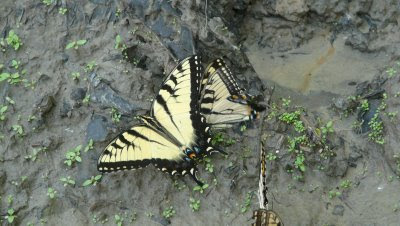
The Mississippi Delta was shining
Like a National guitar
I am following the river
Down the highway
Through the cradle of the civil war
I'm going to Graceland
Graceland
In Memphis Tennessee
I'm going to Graceland
Poorboys and Pilgrims with families
And we are going to Graceland
Lyrics to Graceland, Paul Simon
We're on that ribbon of highway, coming north from Louisiana. After a layover in Jackson, Mississippi, at a spectacular campground on the edge of a lake, we were refreshed and ready to roll.
Our neighboring camper, in an eight-foot-square blue tent, had installed an air conditioner in the wall of his tent. That's roughing it in America, folks.
Before we left the camp we were visited by a red-tailed squirrel who knew no fear. He perched on our windshield wipers and nosily looked inside our rig. Then we heard him rummaging around in the engine compartment. Chai was quite perturbed. Pictures are to be found if you click on those.
The road out of the Louisiana lowlands, through the delta and the bayous, was like a washboard, pretty rough. Even though it is an interstate highway, it was desperately in need of repair because the concrete slabs seemed to have subsided just a hair. As a result, there was a constant thunking as we moved along over each of the discrepancies.
When we came to the northern edge of Mississippi, 585 miles after we filled up our gas tank in western Florida, we stopped and were shocked to find that we had not screwed the fuel filler cap back on after our last fill-up. So first thing after getting into our campground (Elvis Presley RV Park, in Memphis just down the road from Elvis' Graceland), we went off in search of a replacement filler cap. We found it at an auto store a few blocks up the road.
We lingered at sunset along the Mississippi, with the great steel pyramid of Memphis to our right, then it was on to Beale Street for a little blues before winding our way back to the campground where we found our electricity had shut off. After checking the box, I decided to move to another site which had juice. That kept us cool during the steaming night.
We threw ourselves into the maelstrom of Wednesday morning rush-hour traffic that is Interstate 55, heading for St. Louis. I chuckled when we came through numerous work sites along the highway where there are signs that warn if you hit a workman with your vehicle, there is an automatic fine of $11,000. This is much more expensive that my friend Oswald Shivute warned me would be my fate were I to hit a woman in the north of Namibia (three cattle) or even a man (six cattle).
We stopped for the night on the western shore of the Mississippi at the Trail of Tears State Park in Missouri. This marks the part of the great river that the Cherokee Indians crossed during the enforced march from their tribal homelands in Georgia after gold was discovered and the whites decided that they should have that land.
General Winfield Scott was given the task of moving the Indians. He was generally thoughtful and kind (“Every possible kindness...must be shown by the troops."). But one U.S. Army private, John G. Burnett, reported: “I saw he Cherokees...dragged from their homes and driven at the bayonet point into the stockades....I saw them loaded like cattle...into wagons.... Many of them had been driven from home barefooted.”
Quatie Ross, the Cherokee chief's wife, gave her only blanket to a child. She died of pneumonia. Some drank stagnant water and died from disease. One survivor told how his father got sick and died; then, his mother; then, one by one, his five brothers and sisters. “One each day. Then all are gone.”
The forced march resulted in the deaths of thousands of Cherokees. Two thirds of the ill-equipped Cherokees were trapped between the ice-bound Ohio and Mississippi Rivers during January of 1839. The Indians were resettled in Oklahoma, near Tahliquah. It remains the tribal headquarters of the Cherokee Nation today.
About 1,000 Cherokees in Tennessee and North Carolina escaped the roundup. They gained recognition in 1866, establishing their tribal government in 1868 in Cherokee, North Carolina. Today, they are known as the Eastern Band of Cherokee Indians.
Picture at the top of Blog: We came upon these butterflies resting on the banks of the Mississippi at the Trail of Tears State Park. There were dozens of them resting and taking sustenances from the muddy banks of the river.
No comments:
Post a Comment